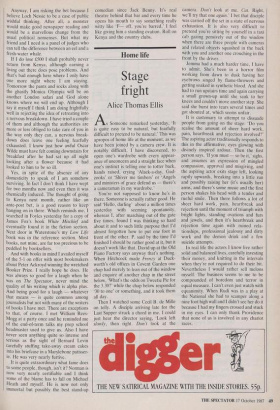Home life
Stage fright
Alice Thomas Ellis
As Someone remarked yesterday, 'It is quite easy to be natural, but fearfully difficult to pretend to be natural.' This was apropos of home life at the moment, as we have been joined by a camera crew. It is notably difficult, I have discovered, to open one's wardrobe with every appear- ance of unconcern and a straight face when one's instinct is telling one to totter back, hands raised, crying 'Alack-a-day, Gad- zooks' or 'Shiver me timbers' or 'Angels and ministers of grace defend us — there's a cameraman in my wardrobe.'
You're not supposed to know he's in there. Someone is actually rather good. He said 'Hello, darling' about a million times yesterday with seeming spontaneity, whereas I, after marching out of the gate five times, found I was thinking so hard about it and to such little purpose that I'd almost forgotten how to put one foot in front of the other. P. said by the time I'd finished I should be rather good at it, but it doesn't work like that. David up at the Old Piano Factory says anyway that's nothing. When Hitchcock made Frenzy at Duck- worth's old offices in Covent Garden one
• chap had merely to lean out of the window and enquire of another chap in the street below, 'What's the odds on Tweetie Pie for the 3.30?' while the chap below responded '30 to one' or something, and it took them all day.
Then I watched some Cecil B. de Mille on telly. A disciple arriving late for the Last Supper struck a chord in me. I could just hear the director saying, 'Look left slowly, then right. Don't look at the camera. Don't look at me. Cut. Right, we'll try that one again.' I bet that disciple was carried off the set in a state of nervous exhaustion. It is also very difficult to pretend you're sitting by yourself in a taxi cab gazing pensively out of the window when there are three people with cameras and related objects squashed in the back with you and another one crouching in the front by the driver.
Jemma had a much harder time, I have to admit. She's been in a horror film working from dawn to dusk having her eyebrows singed by flame-throwers and getting soaked in synthetic blood. And she had to run upstairs time and again carrying a small grown-up until she, sank to her knees and couldn't move another step. She said she burst into tears several times and got shouted at, which seems unfair.
It is customary to attempt to dissuade people from going on the stage: `Do you realise the amount of sheer hard work, pain, heartbreak and rejection involved?' The aspiring actor traditionally responds to this in the affirmative, eyes glowing with divinely inspired ardour. Then the first person says, `If you must — so be it,' sighs, and assumes an expression of mingled compassion, approval and misgiving, and the aspiring actor exits stage left, looking raptly upwards, breaking into a little run and possibly raising her (it's usually her) arms, and there's some music and the first person shakes his head with a tender and rueful smile. Then there follows a lot of sheer hard work, pain, heartbreak and rejection until the moment of triumph with bright lights, standing ovations and furs and jewels, and then it's heartbreak and rejection time again with ruined rela- tionships, professional jealousy and dirty work and the demon drink and a few suicide attempts.
In real life the actors I know live rather solid and balanced lives, carefully investing their money, and knitting in the intervals when they're not required to do their bit. Nevertheless I would rather sell melons myself. The business seems to me to be compounded of boredom and terror in equal measure. I can't even just watch with equanimity. When Rudi was in a play at the National she had to scamper along a nine foot high wall and I didn't see her do it because I had my fingers crossed and stuck in my eyes. I can only thank Providence that none of us is involved in any chariot races.


























































 Previous page
Previous page